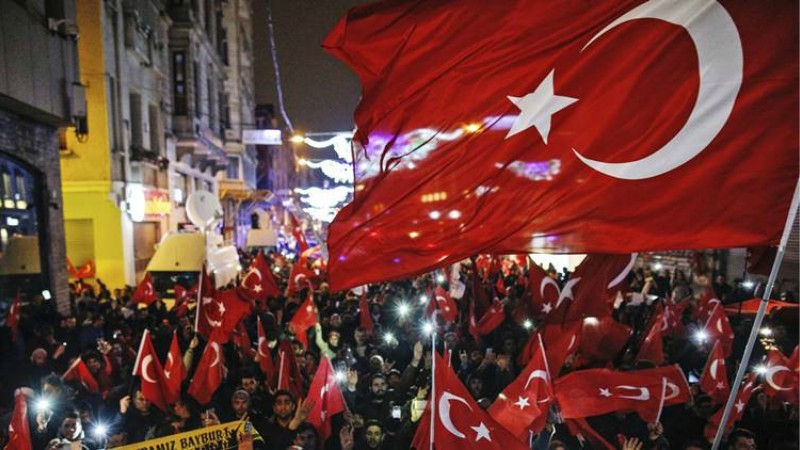
Turkey is scheduled to vote in a supremely crucial Constitutional Referendum on the 16th of April which will seal the fate of the Republic’s political future and system of governance i.e. either Parliamentary (the current system) or Presidential (the proposed system). Leaders of the 4 major national parties are extensively campaigning not only in Turkey but also European countries with significant Turkish diaspora. Of late we’ve seen tensions flaring between Turkey and Europe. Does this in anyway imply Europe’s unhappiness & disagreement with reference to Turkey’s proposed transition?
Ever since the month of March began, Turkish ministers have been rocked with last minute cancellations of permits and permissions to hold rallies or address a crowd in towns and cities across Germany, The Netherlands and Austria. There are reports of rallies being cancelled in Switzerland too. Germany and the Netherlands are home to millions of Turkish nationals or German/Dutch nationals with origins in Turkey. The logic can translate to literally every home or most of the homes in Turkey having a family member living in either of these two countries. Precisely the reason why Turkish bilateral relations with Germany and the Netherlands are very important.
In an attempt to woo the Turks living in the EU to support their campaign, leaders primarily from the ruling party have been flying to Europe to garner greater votes and gain momentum for their agendas. The number of Turks living in the EU are roughly estimated to be somewhere between 3-4.5 million with 1.5 million living in Germany alone. But things, unfortunately, did not pan out the way in which the leaders thought they would.
March 2nd to March 11th saw Germany cancelling permits for Turkish ministers which included the Justice Minister Bekir Bozdağ, Economy Minister Nihat Zeybekci, Foreign Minister Mevlüt Çavuşoğlu and Minister of Family and Social Policies Fatma Betül Sayan Kaya. Most of the ministers ended up addressing crowds in very informal setups and not in the scheduled location because of restrictions put across by German authorities. March 10th and 11th was when the Netherlands stopped the Minister of Family and Social Policies Fatma Betül Sayan Kaya from not only addressing crowds in two towns but also from entering the Turkish embassy in Rotterdam. Foreign Minister Mevlüt Çavuşoğlu’s flight was not allowed to land in Amsterdam by Dutch authorities who cited security concerns to be the reason.
After this began a brutal war of words between Turkey and the Netherlands in particular where the Turkish President and Foreign Minister called the Dutch as Nazi remnants, Fascists and accused them of Islamophobia. The Germans were accused of the same. The Minister of Family & Social policies additionally accused the Dutch police of being very rude to her despite her being a minister in Turkey. Protests broke out in the Netherlands were Turkish nationals marched in support of their government in Ankara. It is alleged and reports from Turkish media houses state that the Dutch police used a lot of force to curb protests and even let police dogs free because of which a lot of protesters have been bitten by the police dogs. Turkey has asked the Dutch government to formally apologise for their behaviour and also learn international diplomacy from them. Meanwhile, Germany and the Netherlands have lashed back at Turkey for making references to Nazis and drawing associations with them.
Currently, Dutch embassies and consulates in Istanbul and Ankara have been shut. There were reports of the Dutch flag being replaced by the Turkish flag in the Dutch consulate in Istanbul. Turkey has asked the Netherlands’s ambassador to Turkey who is on a holiday right now to stay away for a little longer. The Netherlands has also asked Turkey to offer a formal apology for all the remarks made by the President and the Foreign Minister. But Foreign Minister Mevlüt Çavuşoğlu continues to lash at the Netherlands till now. Germany and Turkey relations have been strained for the longest time after Germany’s move to formally acknowledge Turkey’s role in the Armenian Genocide, the arrest of journalist Deniz Yucel who works for Berlin-based media house DW and particularly after the 15th July military coup where Turkey accuses Germany of not only safeguarding a lot of coup plotters (members or supporters of the Gülen movement and PKK- The Kurdish militant group) but also for being a breeding ground for lot of anti-Turkey sentiments.
While human rights and press freedom have literally gone for a toss in Turkey, there have been questions of whether Europe intends to tame down Erdoğan’s ambition of ruling Turkey with an iron fist and eventually imply greater support to the NO campaign. There have been reports of only the ruling party’s permissions gets revoked by Europe while the opposition continues to enjoy their rights to campaign and address. Though this fact cannot be verified countries across Europe have taken cognizance of the seriousness of this issue. Denmark supports Germany and the Netherlands’ stand in the matter and the Danish Prime Minister called off a meet with the Turkish Prime Minister which was supposed to take place on a date which was yet to be scheduled. France has called for efforts to de-escalate the matter and in fact, foreign minister Çavuşoğlu addressed his last talk in a town on the French-German border. But Conservative French Presidential Candidate François Fillon has accused the French President Francois Hollande of taking a stand, not in tandem with the rest of Europe. With tensions not seeming to potentially rest anytime soon the question that arises is whether Europe is looking at diplomatically and politically isolating Turkey completely?





